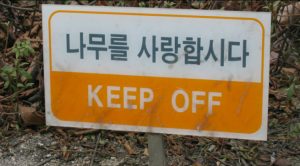
Language learning beyond translation: “Lets love (respect) the trees,” reads the Korean portion of this sign along a walking path in Seoul, South Korea.
It’s an exciting time to be thinking about linguistic landscape in language teaching in the U.S. Next May the annual linguistic landscape workshop, which has been held the last 6 years in Israel, Italy, France, Ethiopia, Belgium, and South Africa, will be held at UC Berkeley. Along with this, the number of researchers investigating the visibility of multiple languages in public spaces is diversifying both in form and focus. And, with a language center’s interest in language teaching and learning in mind, it’s encouraging to see many projects bridging classroom practice with interpretive, critical, and creative work in the streets of the city.
Following my trip in April this year to this year’s LL workshop at the University of the Western Cape in Cape Town, and a presentation shortly after at Columbia’s Language Resource Center, I had been looking forward to an opportunity to talk about LL teaching and learning ideas with Yale language faculty and others in the community here. And so I was very glad that last week’s Brown Bag discussion allowed us to do this. I gave a talk for the better part of an hour, giving some background on LL as an emerging field and narrating a few of my experiences teaching with and in the LL: an online discussion forum for learners of Korean in the U.S. and learners of English in Korea to discuss the cultural significance of written language in everyday urban life, and a freshman/sophomore seminar for investigating questions of diversity, representation, and cultural history with respect to East Asian languages in the linguistic landscape of the San Francisco Bay Area. The slides for my presentation are here:
The best part of the event for me was (as is always hoped for, I think) the question, answer, and discussion period afterwards. Amidst the challenge of seeing as many languages in a relatively small city like New Haven, I sensed a lot of interest in bringing the languages of the city into classrooms at Yale (beyond what’s already taking place, which I have much to learn about), and in bringing the classroom out to the community. I’m looking forward to continuing the conversation and supporting projects in this area, and hope anyone who has ideas or questions along these lines will leave a comment here or get in touch (david.malinowski@yale.edu) to talk more.
Also, in thinking about lessons that the LL literature might already present opportunities for language classes here at Yale (and wherever else readers of this post might find themselves!). I’ve created an open Google doc for sharing resources, references, and teaching ideas. To start off with, it outlines a “3 spaces” pedagogical model that encourages learners to juxtapose different sorts of engagement with language and place—from their own observations, from policy and historical perspectives, and in the views of others who live and move through multilingual spaces. Please take a look, and feel free to contribute.